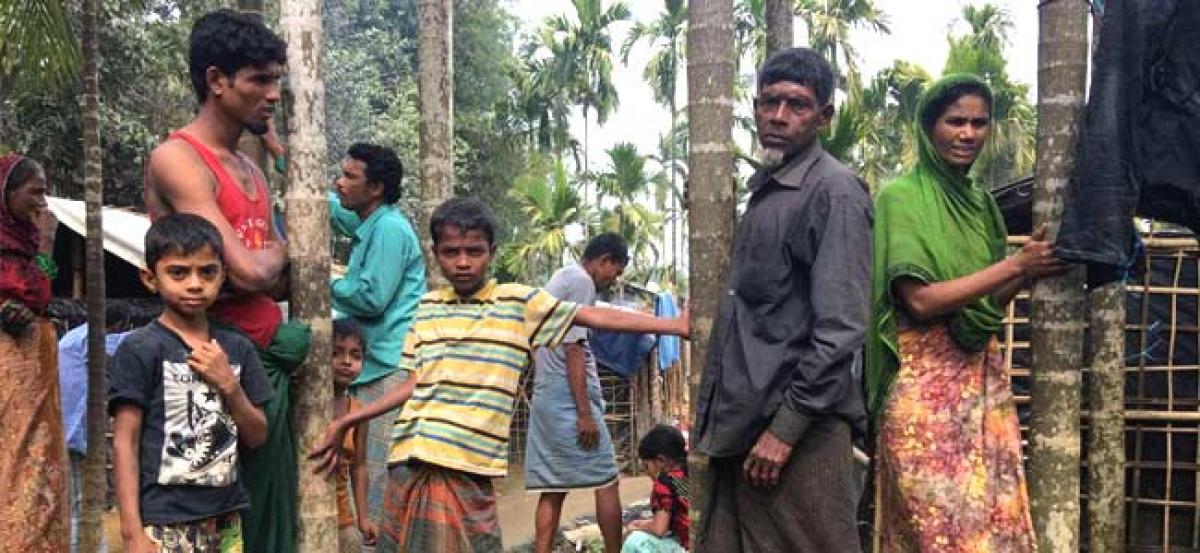Live
- GMR Airports Unveils AI-Powered Digital Twin Platform to Transform Airport Operations
- India poised to become leading maritime player: PM Modi
- Top Causes of Kidney Stones and How to Recognize Silent Symptoms
- India’s renewable energy capacity logs 14.2 pc growth at 213.7 GW
- Winter Session of Odisha Assembly adjourned sine die
- Biden calls Trump's tariff approach 'major mistake'
- After Drama Over Eknath Shinde’s Chief Minister Race, Maharashtra Cabinet Formation Faces New Tensions
- Egyptian FM, Blinken discuss recent developments in Syria
- Iran's supreme leader says Syria's developments result of US-Israeli 'plot'
- Elon Musk to Purchase $100 Million Luxury Mansion Next to Donald Trump's Mar-a-Lago, Report Reveals
Just In

About 150,000-200,000 Rohingya refugees in Bangladesh\'s Cox\'s Bazar are at risk from flooding and landslides during the monsoon season, the UN has said.
About 150,000-200,000 Rohingya refugees in Bangladesh's Cox's Bazar are at risk from flooding and landslides during the monsoon season, the UN has said.
UN Secretary General Antonio Guterres' spokesperson St phane Dujarric told reporters on Tuesday at more than 7,000 Rohingya refugees were affected by storms or landslides earlier this month, at the start of the monsoon season.
The monsoons typically deposit 2.5 meters of rain on Cox's Bazar, resulting in significant flooding. As a result, 150,000-200,000 refugees and 883 community facilities are at risk from flooding and landslides during the monsoon season, including 25,000 refugees at critical risk, he said.
Dujarric said UN Agencies have ramped up preparedness activities to mitigate the effects of the rains on refugees.
While Bangladesh has been dealing with monsoons annually and has developed some experience in these matters, the situation present in the refugee camps is unique in scope and volume, and the international humanitarian community is working to support and protect the refugee communities most at risk, he said.
"The lack of sufficient safe space for at-risk refugees and of safe shelters, limits the UN's risk mitigation possibilities," Dujarric said.
Meanwhile, the United Nations migration agency said a major canal dredging project underway in Southern Bangladesh to protect Rohingya refugees from monsoon floods will have the added benefit of boosting local agriculture.
The International Organization for Migration (IOM) is overseeing the dredging of more than nine kilometres of abandoned canals, which will then be renovated, in the Cox's Bazar area, which is home to around 700,000 mainly-Muslim Rohingya who have fled violence in northern Myanmar.
The IOM said the project in Ukhiya sub-district would prevent flooding and allow water runoff during the annual heavy rains that come with the arrival of monsoon season. Moreover, the UN agency has employed 50 Bangladeshi labourers locally, to carry out the work, as part of a wider IOM-supported disaster-preparedness programme.
The project will not only help safeguard lives and livelihoods when the monsoon hits by reducing the risk of flooding, it will also provide much-needed irrigation channels during the dry season.
There was no water flow in the canal, as it hadn't been maintained for years, said the agency's Damon Elsworth.
This resulted in flooding in the surrounding communities during the monsoon as the rainwater coming down from the adjacent hills couldn't flow through, Elsworth said.
Cox's Bazar was already prone to landslides and flooding, even before hundreds of thousands of Rohingya refugees began arriving at the end of last August. IOM, the World Food Programme (WFP) and the UN human rights office (OHCHR) are participating in the USD 20,000 canal clearing project.
Other IOM projects include bridge building, access roads, steps, drains, and slope protection work, to enable communities cope with the monsoon. The agency is also stockpiling emergency aid, such as tarpaulins, food, water and medical supplies to ensure that urgent needs of both the refugee and host communities are met.

© 2024 Hyderabad Media House Limited/The Hans India. All rights reserved. Powered by hocalwire.com







